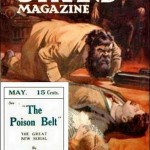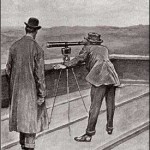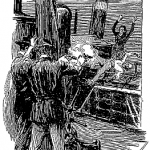“Ah, dat was the most worst thing of all, for I followed them mit a friend of mine, and when we caught them I did not let her know, but I called him out of his hotel, and I told him that he must fight me. Dat vos a mistake. I should have done him an insult, and then he vould have had to ask me to fight, and I could have chosen my own veapon. As it was he chose swords, for he knew veil that I knew nothing of them, and he had been the best fencer in the whole of his University. Then we met in the morning, and before I had time to do anything he ran me through the left lung. I have shown you the mark of it. After dat I vas in bed for two month and more, and it still hurts me ven de veather is cold. That is vat they call satisfaction,” Baumser added, pulling his long red beard reflectively. “To me it has ever seemed the most dissatisfactory thing that could be imagined.”
“I don’t wonder you’re afraid of the women after that,” said the major, laughing. “There are plenty of good women in the world, though, if you have the luck to come across them. D’ye know a young fellow called Dimsdale—? Ah, you wouldn’t, but I’ve met him lately at the club. He’s got a girl who’s the adopted daughter of that same ould Girdlestone that we talk about. I saw the two of them togither one day as happy as a pair of young love birds. Sure, you’ve only got to look at her face to see that she’s as good as gold. I’ll bet that that woman over the strate there is another of the right sort.”
“Dat voman is alvays in your head,” the German said, with a smile. “You shall certainly dream about her to-night. I remember a voman in Germany—” And so these two Bohemians rambled on into the small hours, discoursing upon their past experiences and regaling each other with many reminiscences, some of which, perhaps, are just as well omitted and allowed to sink into oblivion. When the major finally retired for the night, his last thought was of the lady at the window and of the means by which he might contrive to learn something of her.
These proved to be more easy than he anticipated, for next morning, on cross-examining the little servant girl from whom Von Baumser had derived his information, the major found out all that he desired to know. According to this authority, the lady was a widow of the name of Scully, the relict of a deceased engineer, and had been staying some little time at Morrison’s, which was the rival establishment to that in which the major and Von Baumser resided.
Armed with this information, the major pondered for some time before deciding upon his course of action. He saw no possible means by which he could gain an introduction to his charming neighbour unless he had recourse to some daring strategem. “Audace et toujours audace” had always been the soldier’s motto. He rose from his chair, discarded his purple gown, and arrayed himself in his best attire. Never had he paid such attention to his toilet. His face was clean shaven and shining, his sparse hairs were laid out to the best advantage, his collar spotless, his frock coat oppressively respectable, and his tout ensemble irreproachable. “Be George!” he said to himself, as he surveyed himself in the small lodging-house glass, “I’d look as young as Baumser if I had some more hair on me head. Bad cess to the helmets and shakoes that wore it all off.”
When his toilet was fully completed and rounded off by the addition of a pair of light gloves and an ebony stick with a silver head, the veteran strode forth with a bold front, but with considerable trepidation at his heart; for when is a man so seasoned as to have no misgivings when he makes the first advances to a woman who really attracts him? Whatever the major’s inward feelings may have been, however, he successfully concealed them as he rang the bell of the rival lodging-house and inquired of the servant whether Mrs. Scully was at home.
“Yes, sir, she is,” said the slavey, with a frightened bob, which was a tribute to the major’s martial mien and gorgeous attire.
“Would you tell her that I should like to see her,” said the major boldly. “I shan’t detain her a moment. Here is my card—Major Tobias Clutterbuck, late of the 119th Light Infantry.”
The servant disappeared with the card, and presently returned with a request that he would step up. The old soldier stumped his way upstairs with the firm footfall of one who has taken a thing in hand and means to carry it through at all hazard. As he ascended, it seemed to him that he heard the sound of feminine laughter in the distance. If so, it could hardly have come from the lady whom he was in quest of, for he was shown into a large and well-furnished room, where she sat looking demure and grave enough, as did another young lady who was crocheting on the ottoman beside her.
The major made his most courtly bow, though he felt very much as the Spaniards may be supposed to have done when they saw their ships blazing behind them. “I trust you will excuse this intrusion on my part,” he began. “I happened to hear that a lady of the name of Scully was stopping here.”
“My name is Scully, sir,” said the lady, whose dark eyes had allured the major to this feat of daring.
“Then perhaps, madam,” the veteran said with another bow, “you will allow me to ask you whether you are any relation to Major-gineral Scully, of the Indian Sappers?”
“Pray take a seat, Major—Major Clutterbuck,” said Mrs. Scully, referring to his card, which she still held in her very well-formed little hand. “Major-general Scully, did you say? Dear me! I know that one of my husband’s relations went into the army, but we never heard what became of him. A major-general, is he? Whoever would have thought it!”
“As dashing a souldier, madam,” said the major, warming into eloquence, “as ever hewed a way through the ranks of the enemy, or stormed the snow-clad passes of the Himalayas.”
“Fancy!” ejaculated the young lady with the crochet needle.
“Many a time,” continued the soldier, “he and I after some hard-fought battle have slept togither upon the blood-stained ground wrapped in the same martial cloak.”
“Fancy!” cried both ladies in chorus; and they could not have selected a more appropriate interjection.
“And when at last he died,” the major went on with emotion, “cut in two with a tulwar in a skirmish with hill tribes, he turned to me—”




